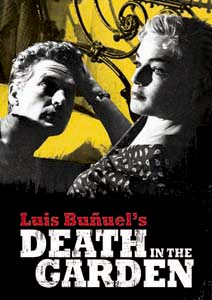|
Reviews of Recent Independent, Foreign, & Documentary Films in Theaters and DVD/Home Video
DEATH IN THE GARDEN In a small South American mining outpost, where prospectors are told outright by the local army that they can’t mine for any riches anymore, a sort-of revolution breaks out among the miners, and martial law declared. Amid the building chaos, there’s an outlaw Chark (Georges Marchal) on the lam for a robbery and an older miner, Castin (Charles Vanel), who wants to marry a local prostitute (Simone Signoret) and return to France to make a better life for his mute daughter. But after the rogue Chark (yeah, quite the name) is arrested and then thrown in jail, he busts out of his confinement and runs into Castin, his daughter, the hooker, and a neighborhood priest (Michel Piccoli, his first of many films for director Luis Buñuel), and takes them hostage on a riverboat sailing into the jungle. From here on—about halfway through the film—the story takes a turn into the survival of the fittest, man vs. nature. Up until then it’s been a little… run of the mill, more so than one might expect from one of the most subversive filmmakers in the medium. When one pictures a story like this being told by a filmmaker who has run the gamut from the surreal (L’Age D’Or), the absurd (The Phantom of Liberty), or even the neo-realistic (Los Olvidados), one may not imagine a standard action-adventure story. At the least, one might expect some eccentricities or an emphasis on class or some satire thrown in for good measure. The first half is a setup for the characters, who have some moments of interest—mostly from Signoret’s performance as a tough gal with a conflicted view of what her life should be (should she go with the old miner as his wife or remain a whore?) and from a quietly moving Piccoli as Father Lizardi. Frankly, the first hour goes on too long and to a point where one doesn’t see any adventure really taking shape. It’s not very involving and its scenes unfold as if overseen by a hired gun (by-the-book angles and less-than-interesting performances from everyone else in the cast) as opposed to a master director. But in the jungle, ah, there’s where things start to become intriguing. Suddenly the roles put forward so conventionally start to break apart, and the characters are all given further dimensions. Most surprising is Chark, who up until then has been one of those one-note villains who just barks orders with either a gun or knife in his hand. He becomes a (anti-) hero, along with Father Lizardi. It’s not even so much the obvious Buñuelian touches that come up in the second half (the trademark fascination with insect imagery as ants devour a snake carcass), though there is that. It’s the general tone and the strengths and moral weaknesses of the characters that distinguishes Death in the Garden in its second half as a lean survival story. Maybe Buñuel needed time to build the characters to knock them down, or to see what makes them all tick, or just to capture the contrast between the chaos in nature and the street fighting earlier in the film. This is not one of Buñuel’s best, but it gets better as it goes along and boasts some breathtaking color cinematography by Jorge Stahl Jr., plus some eerie musical tones during the jungle scenes. DVD Extras:
Included for Buñuel fan are some good goodies, including an audio
commentary from Ernesto R. Acevedo-Munoz, who gives insight into the
production and Buñuel’s working methods; and an interview with the
congenial Piccoli, who tries to his best not to betray Buñuel’s privacy.
Jack Gattanella
|


